Select Works of Charles Bridges (8 vols.)
Digital Logos Edition
Overview
Tap into the experience and insight of leading nineteenth-century evangelical Anglican, Charles Bridges. Regarded by his peers as one of the most spiritually devoted, hard-working clergyman in the Church of England, Bridges wrote extensively on issues that plagued pastoral work and preaching in England. 150 years later, his literary work expresses truth applicable to ministry today.
You’ll dig into Psalm 119, Proverbs, and Ecclesiastes with commentary still read over and over again today. His rich pastoral text, The Christian Ministry went through several editions internationally, and holds its value as a ministry resource to this day. His Essay on Family Prayer and Address to Young Persons after Confirmation demonstrates a commitment to pastoral work that reaches all people, young and old. Bridges’ work is valuable both for its insight into the Church of England in the nineteenth century, and its timeless commentary on Christian ministry and discipleship.

- Critiques the pastoral work and preaching of Christian ministers
- Offers classic Evangelical commentaries on the poetic books of the Old Testament
- Includes resources for developing the devotional lives of families and youth
- Title: The Works of Charles Bridges
- Author: Charles Bridges
- Volumes: 8
- Pages: 2,208
- Christian Group: Anglican/Evangelical
- Resource Type: Collected Works
- Topic: Practical Life
- Exposition of Psalm 119
- An Exposition of the Book of Proverbs
- An Exposition of the Book of Ecclesiastes
- The Christian Ministry: With an Inquiry into the Causes of Its Inefficiency, vol. 1
- The Christian Ministry: With an Inquiry into the Causes of Its Inefficiency, vol. 2
- Scriptural Studies
- An Essay on Family Prayer
- An Address to Young Persons after Confirmation

Looking at Psalm 119—the longest Psalm in the Bible—under a microscopic lens, Charles Bridges takes the time to explain each verse and how it fits into the Bible. Rich with biblical knowledge and cross-references, this picture of Psalm 119 is a thoroughly researched compendium. Written when he was only 33 years old, Bridges composes a sermon for each of the psalm’s 22 stanzas.
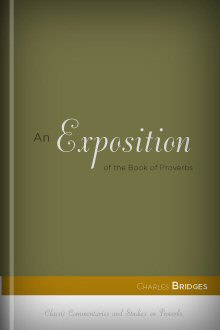
Charles Bridges’ An Exposition of the Book of Proverbs exhorts and encourages believers to walk in the way of wisdom by considering the weight of the Proverbs’ instructions. Taking a chapter-by-chapter, verse-by-verse approach, this exposition on the Book of Proverbs offers insight into and wisdom on the words of Solomon, inviting the reader to explore the spiritual ramifications of each of the wise king’s admonitions. Bridges stresses that the purpose of Proverbs is that it be read and regarded in light of its relevance to daily life, in order that we might become “men of sound godliness.”
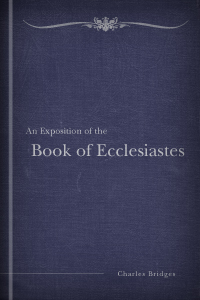
Offering an extensive commentary on the book of Ecclesiastes, Charles Bridges discusses authorship, transcription and transposition of the text, the inherent theopneustic nature, and the scope and focus of the text. Bridges provides critical notes for explanation of semantics, further reading, and doctrinal clarification. Bridges concludes that the text is undoubtedly the product of divine inspiration.
Mr. Bridges is the author of several well-known and highly esteemed practical works. This volume is of the same general character. The author is indeed a scholar . . . he is conversant with the discussions of authorship, authority, and exposition of the Book of Ecclesiastes.
—The Biblical Repertory and Princeton Review
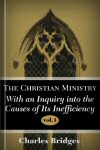
Gain insight into the timeless purpose of Christian ministry and the problems that every minister faces with Charles Bridges’ classic, The Christian Ministry. With evangelical passion, Bridges uses illustrations from his own and others’ ministry experience to demonstrate what slows down or altogether halts a minister’s progress. In volume 1, Bridges (1) defines Christian ministry, (2) identifies several general causes for a ministry’s failure and problems in a minister’s character that can slow ministry, and (3) analyzes the “public work” of ministry, focusing on preaching from the Bible.
Mr. Bridges is a distinguished clergyman of the Church of England—a man of sterling piety, of the most decidedly evangelical sentiments, and of a catholic spirit towards Christians of other denominations. [The Christian Ministry] is, in my opinion, calculated for general usefulness, but will be found eminently adapted to the use of students preparing for the work of the ministry, and of those already engaged in its sacred duties.
—James Milnor, U.S. Representative from Pennsylvania and rector, St. George’s Chapel, New York, New York
An old English book, The Christian Ministry by Charles Bridges, has blessed me tremendously.
—from Missiology: An Introduction to the Foundations, History, and Strategies of World Mission
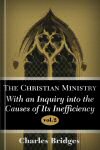
Continue studying the timeless purpose of Christian ministry and the problems that every minister faces, with volume 2 of Charles Bridges’ classic, The Christian Ministry. With evangelical passion, Bridges uses illustrations from his own and others’ ministry experience to demonstrate what slows down or altogether halts a minister’s progress. In volume 2, Bridges (1) finishes his analysis of problems with Christian preaching, (2) examines stumbling points in a minister’s pastoral care for parishioners, and (3) provides a final reflection.
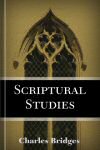
Composed of “conversations at a breakfast table,” Charles Bridges’ volume of scriptural studies makes a warm addition to any devotional library. Known as a dutiful, hard-working pastor and preacher, Bridges shares scriptural insights saturated with adoration for his creator and reverence for his Word. Each study features a passage of Scripture, followed by Bridges’ thoroughly cross-referenced analysis of its themes. Bridges closes each entry with a short prayer or set of reflective questions and remarks.

Believing the spiritual vitality of family units to be integral to God’s mission through the church, Bridges wrote this essay encouraging family prayer. “For as personal religion cannot exist or be sustained without personal prayer,” he writes, “so neither can we identify family religion without family prayer, or fail to number this daily privileged service as a most valuable ordinance of social godliness.” His essay is a stirring call for fathers and mothers to lead the charge in disciple making.

Filled with imagery of the battlefield and athletic endurance, Charles Bridges’ address to newly confirmed youth is a fiery call to diligent discipleship in “every future moment.” Bridges writes that we “are every moment assaulted by some of the enemies of [our] soul,” and that at “every moment either the faith you professed is encouraging you to resist them; or, in the neglect of this faith, you are tamely yielding to them.” This Scripture-filled document is an excellent reminder to any Christian of the importance of ongoing devotion and the scope of our fight.
This title is included in the following collections
You can save when you purchase this product as part of a collection.
Logos 7 Anglican Silver Legacy...
$349.99$349.99Logos 7 Anglican Gold Legacy L...
$849.99$849.99Logos 7 Anglican Platinum Lega...
$1,499.99$1,499.992025 Anglican Diamond
$2,999.99$2,249.99
- $2,999.99
- $4,749.99$3,562.49
- $4,749.99
- $23,999.99$17,999.99
Charles Bridges (1794–1869) was an Anglican preacher, Puritan, and theologian, and a leader in the evangelical wing of the Church of England. Bridges attended Queens’ College, Cambridge and was ordained in 1817. He served as vicar of Old Newton, Suffolk; Weymouth, Dorset; and Hinton Martell, Dorset.